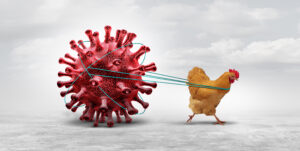Key Points:
- In today’s Recommendations for Industry, we discuss how businesses can assess risk when considering lifting of COVID protections, including masking. Read more below.
- US COVID cases, hospitalizations continue steady decline. Average daily COVID-19 cases and hospitalizations are continuing to fall in the U.S., an indicator that the Omicron variant’s hold is weakening across the country. Total confirmed cases reported Saturday barely exceeded 100,000, a sharp downturn from around 800,850 five weeks ago on Jan. 16, according to Johns Hopkins University data. In New York, the number of cases went down by more than 50% over the last two weeks.
- States Drop Mandates. California became the first state to formally shift to an “endemic” approach to COVID-19. On Thursday, Gov. Gavin Newsom announced a plan emphasizing prevention and quick reaction to outbreaks over mandated masking and business shutdowns. Two of the last mainland states with mandates are dropping them: New Mexico has lifted its indoor mask mandate, including for schools; Washington State will eliminate the state’s mask mandates, including for schools, at the end of March. Hawaii is the only state that has not yet announced plans to relax mask requirements.
- In the UK – Britain’s Prime Minister Boris Johnson announced a plan for “living with COVID,” phasing out free testing for most people and removing requirements to self-isolate after testing positive.
- The CDC Isn’t Publishing Large Portions of the COVID Data It Collects. A NYT article has called out CDC for withholding critical data on boosters, hospitalizations and, until recently, wastewater analyses. The agency recently debuted a dashboard of wastewater data on its website that will be updated daily and might provide early signals of an oncoming surge of COVID cases. Some states and localities had been sharing wastewater information with the agency since the start of the pandemic, but it had never before released those findings. Wastewater surveillance across the nation would spot outbreaks and emerging variants early.
- Covid Patients May Have Increased Risk of Developing Mental Health Problems. A large new study published Wednesday in the journal The BMJ, found that people who had COVID were 39 percent more likely to be diagnosed with depression; 35 percent more likely to be diagnosed with anxiety; 38 percent more likely to be diagnosed with stress and adjustment disorders; and 41 percent more likely to be diagnosed with sleep disorders than uninfected people. The study analyzed records of nearly 154,000 COVID patients in the Veterans Health Administration system who had no mental health diagnoses or treatment for at least two years before becoming infected, and compared their experience in the year after they recovered from their initial infection with that of a similar group of people who did not contract the virus.
- Africa may have been hit harder by COVID-19 than anyone knew. New studies have suggested that the number of COVID-19 cases may be vastly undercounted across Africa, and that the number of deaths in at least one country could be significantly undercounted. But reliable public tracking of cases is dependent on easy access to coronavirus tests and the expensive infrastructure to administer and track their results. Many African nations have neither. With 83 percent of people in Africa still not having received a single dose, it creates ideal conditions for new variants to emerge.
- Olympics called ‘one of the safest places on this planet’. The coronavirus infection rate at the Beijing Olympics was 0.01% in the four weeks since a restrictive, three-layer testing system was put in place. More than 1.8 million tests were conducted, and only 437 people tested positive, of which 98 were athletes and 87 were team officials. The other 252 were described as “stakeholders.” The three-layer testing involved athletes taking pre-departure tests in their own country and again upon arrival in Beijing. All participants also were subject to daily PCR testing in the Olympic Villages and at the Olympic venues.
Flu Update:
- CDC – Sporadic influenza activity continues across the country. In some areas, influenza activity is increasing.
- 3.0% positive for influenza this week,1.4% of visits to a health care provider were for respiratory illness (below baseline).
- The majority detected are influenza A (H3N2).
- No jurisdictions experienced moderate, high, or very high activity.
- 0.4% of long-term care facilities reported >1 positive test among residents.
- There were no pediatric deaths.
- Flu continues to dominate news stories, though there were no reports of significantly high incidence.
Food Safety & Public Health:
- Highly Pathogenic Avian Influenza found in 11 states. Highly Pathogenic Avian Influenza (HPAI) has been detected in commercial poultry flocks from Kentucky and Indiana, a mixed species backyard flock from Virginia, and over 100 wild birds from several eastern coastal states—including South Carolina, North Carolina, Maryland, Florida, Delaware, and New Hampshire. Maine and New York have reported highly pathogenic avian flu outbreaks in poultry, both involving backyard flocks, and Indiana reported a fourth H5 outbreak at another commercial turkey farm. The Philippines also reported its first highly pathogenic H5N1 outbreaks in poultry, which struck farms in two provinces.
- OSHA Webinar: Review of OSHA Recordkeeping Requirements and Injury Tracking Application. OSHA is hosting a webinar on its recordkeeping requirements and electronically submitting workplace injury and illness data using the Injury Tracking Application on February 23 from 1:00 – 3:00 p.m. EST. Registration is free.
Recommendations for Industry
Assessing Risk for Lifting Mask Requirements in Your Business
With all mainland U.S. states having lifted mask mandates, but Omicron and the flu still circulating to various extents across the country, businesses are faced with reconsidering their own requirements and risk control measures for protection against both.
Even while we continue to anticipate updated CDC guidelines, TAG has developed a framework for managing masking and other risk-mitigation measures based on community hospitalization and employee respiratory illness rates:
- With the increased use of rapid antigen tests, community case rates and test positive rates have become a less reliable measure of circulating illness because many cases are not reported to public health authorities.
- Internally, monitoring the percentage of the workforce reporting respiratory illness-like symptoms allows for the rapid identification of emerging clusters.
In essence, the higher the rate of hospitalizations and/or percentage of employees with respiratory illness, the greater the need for masking and other measures.
It also is critical, however, that any federal, state, and local requirements take precedence and be checked before a business decides to scale back any risk-mitigation measures.
TAG’s latest version (v6.0) of its COVID-19 Risk Mitigation and Planning Toolkit has been significantly updated to reflect the current COVID situation and relate to other current and potentially emerging infectious disease. For the full risk-mitigation framework and specific parameters on risk calibration levels and measures, contact TAG.
In case you missed it:
- In last Thursday’s Recommendations for Industry, we discussed the question: When can our business reduce or rescind our masking requirements? Read more here.
- Further decline in global COVID cases as deaths stabilize. COVID-19 cases across the globe declined last week for the second week in a row, with illness levels dropping in every region except the Western Pacific, the World Health Organization (WHO) said yesterday in its weekly pandemic snapshot. Cases were down 19% last week compared to the previous week, and deaths held steady after rising steadily for 5 weeks. The Western Pacific region’s rise was led by increases in China, South Korea, Samoa, and Brunei Darussalam. A handful of countries in Asia—which are experiencing later Omicron surges—reported record cases in the past day.
- In the US, newly reported COVID-19 deaths are starting to decline. This is driven by drops in the Northeast and Midwest offering the latest sign that the surge fueled by the highly transmissible Omicron variant is fading. In the South, the average still appears near the peak for the Omicron wave. In the West, death counts in California have recently been on the rise, while the data indicate Nevada may have recently crested.
- Study suggests maternal COVID-19 vaccination protects babies. A COVID-19 vaccination during pregnancy can also protect the infant during the high-risk first 6 months of life. The study examining hospitalization trends across 20 children’s hospitals in 17 states from July 2021 through January 2022 showed that maternal completion of a 2-dose primary mRNA COVID-19 vaccination series during pregnancy against COVID-19 hospitalization among infants aged <6 months was 61%. A separate team that looked at COVID-19 hospitalizations in children found that levels jumped dramatically during the Omicron variant surge, especially in those younger than 4, a group not eligible yet for vaccination.
- Increased infectivity, antibody escape drive SARS-CoV-2 evolution, studies say. In a study published in the Journal of Chemical Information and Modeling, researchers using an artificial intelligence (AI) model showed that Omicron is over 10 times more infectious than the original coronavirus and 2.8 times more infectious than the Delta variant. In addition, Omicron is 14 times more likely than Delta to escape current vaccines, and it is predicted to compromise the efficacy of several monoclonal antibody therapies. Many of the predictions have been verified by emerging experimental results.
- The US government plans to make high-quality face masks available for children. According to Dr. Tom Inglesby, senior adviser to the White House COVID-19 Response Team, “that process is underway.” The forthcoming plan appears to be an extension of the White House’s ongoing effort to distribute 400 million free N95 masks from the Strategic National Stockpile for the public to access at pharmacies and community health centers nationwide.
- Retail sales jumped in January as the Omicron wave started to recede and consumers absorbed high inflation. Sales were up a seasonally adjusted 3.8% from December, the strongest monthly gain since last March, when pandemic-related stimulus was being distributed to households. With COVID restrictions easing and consumer finances their strongest in recent history, Americans are emerging eager to splurge on what they have been missing, including travel, sports events, restaurants, cruises and theme parks.
Food Safety & Public Health:
- Three Human Salmonella Cases Linked to Mass. Company’s Dog Treats.Three human cases of salmonella in people who handled Dog Gone Dog Treats have been reported in Massachusetts. The cases include two adults in their 70s and one child.The dehydrated treats are not fully cooked and include “chicken chips,” beef liver and sweet potato chips in their ingredients, and several bags tested positive for salmonella at the state public health lab.The company has stopped production of the treats; stores have been ordered to remove the treats from shelves; and consumers are advised to dispose of any they have.
- Jan Fruits Inc. Recalls Enoki Mushrooms Because of Possible Health Risk. February 8, 2022, Jan Fruits Inc. of Vernon, CA is recalling all its cases of its 200g/7.05oz packages of Enoki Mushroom (Product of Taiwan) because it has the potential to be contaminated with Listeria monocytogenes.
- FDA Requests Public Comments on the Use of Antimicrobials in Companion Animals. On Wednesday, FDA released a request for public comments about antimicrobial use (AMU) in companion animals (e.g., cats, dogs, horses) and the potential impact of this use on antimicrobial resistance in both animals and people. Recognizing the need to better understand how the use of antimicrobial drugs to treat companion animals (e.g., dogs, cats, and horses) might contribute to the development of antimicrobial resistance in both animals and people, the FDA’s Center for Veterinary Medicine (CVM) intends to use the information collected to help develop strategies to further promote antimicrobial stewardship in companion animals.






